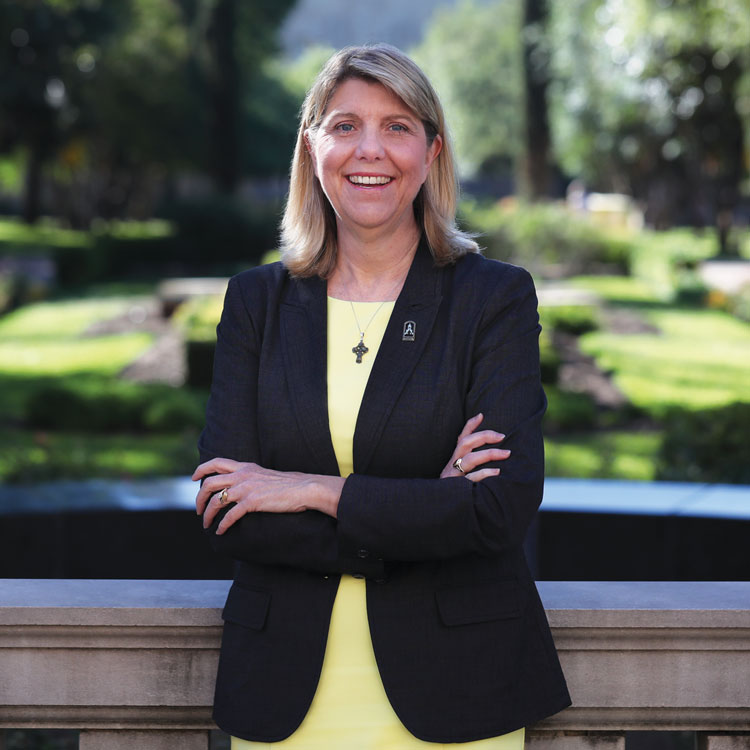Baylor’s Academic Trajectory, Faith Commitment Reinforced Under Livingstone

Long before she was selected as Baylor University's 15th president, before her foray into higher education administration even began, Dr. Linda Livingstone's first loves were teaching and research.
An award-winning educator and published researcher, she has authored numerous journal articles, conference papers, presentations – even textbooks – focused on creativity within organizations as informed by the relationship between employees and the organizational environment. This foundational experience as an academic is one of many reasons Livingstone identifies so strongly with Baylor's commitments to transformational education and compelling scholarship not in spite of, but inspired by Christian faith.
"At the core, one of our principles as a faith-based institution is the belief that all truth is God's truth and that truth is open to inquiry," Livingstone said. "That gives you freedom as a scholar in a Christian institution to ask difficult questions, to investigate them and not be afraid of the answers you get. Sometimes we are criticized in Christian higher education that we are not open to scholarly findings. It's just the opposite if you are truly and honestly a high-level research university, which Baylor is."
Indeed, since 2006, Baylor has maintained its status as a doctorate-granting "research university" with "high research activity," so classified by the Carnegie Foundation for the Advancement of Teaching. Other universities sharing this elite category include Auburn, Oklahoma State University, SMU and Wake Forest. But, Livingstone plans to continue building Baylor's research enterprise. In speaking with Baylor's Board of Regents and with the Presidential Search Committee during an exhaustive interview and selection process, she spoke candidly about her intention to raise the standard of academic achievement and research by students and faculty even higher.
"We talked about the commitment of the University to move to tier-one academic status and to really focus on excelling as an outstanding academic institution; how we are going to continue to support faculty to ensure their success; how we move forward with regard to student life to ensure that we're doing the right things to support students both inside and outside of the classroom," Livingstone said. "We talked more broadly about the mission of the University, how we grow that, the academic trajectory of the University and how we ensure that we continue to advance the University even beyond what it's doing now."
While Livingstone will be coming to Baylor following three years as dean of the George Washington University School of Business and more than a decade as dean of Pepperdine's Graziadio School of Business and Management, her selection as the new Baylor University president is a little like coming home.
Straight out of her doctoral program, between 1991 and 2002, Livingstone taught undergraduate- and graduate-level courses in organizational behavior and management in Baylor's Hankamer School of Business. From 1998 to 2002, she served in her first administrative role as associate dean for graduate programs.
"It was really formative for me to be a faculty member here [at Baylor] early in my career and to be thinking about what it means to integrate your faith and your profession as an academic," she said. "And when Terry Maness [dean, Hankamer School of Business] asked me to be the associate dean for graduate programs in the business school, I think it was in that role I discovered that I really like this. I love to teach, I love the research, but I really liked the opportunity to influence the organization on a broader level."
Returning to Baylor, Livingstone brings the immeasurable leadership experience she has gained elsewhere.
"It makes a huge difference that I spent 11 years [at Baylor] and I know the place and I know it at its core and its soul. And I do understand the deeply held mission of the institution. I understand why people love this place so much," Livingstone said. "Having spent some time at Pepperdine and more recently at George Washington University, I've watched Baylor and seen the tremendous progress that's been made, the advances that have taken place in academics across the university. To be a university that's committed to high-quality scholarship and excellence in academics while maintaining the commitment and engagement with its Christian mission is unusual and something that is very significant."
By integrating faith and academic excellence, Baylor is positioned to bridge an ever-widening chasm seen in academia and in the broader culture – one that divides the individual's professional life from her spiritual life. Livingstone addresses this topic in a 2014 article for the Graziadio Business Review.
"'It is possible to combine genuine religious faith with a genuine commitment to excellence in our tasks in education'," she writes, quoting Stephen Evans, professor of philosophy at Baylor University. "The separation of our personal and spiritual lives in the Academy has been called, 'the two-realm theory of truth.' We are true and faithful believers on the one hand, and on the other hand, we are good scholars, but there is really no meaningful link between those two parts of our lives. However, there is a tremendous opportunity right now to link faith and scholarship."
A believer in Christian higher education, Livingstone views Baylor as a place where outstanding academic scholarship reflects God's glory; and a place where the human side of academia – the obligation to students – will always be a priority.
"While a significant part of our role in the University is to seek truth and understanding through scholarship and intellectual inquiry, we must never forget that we are also here to impact the lives of our students, which includes not only educating the mind, but also the heart."